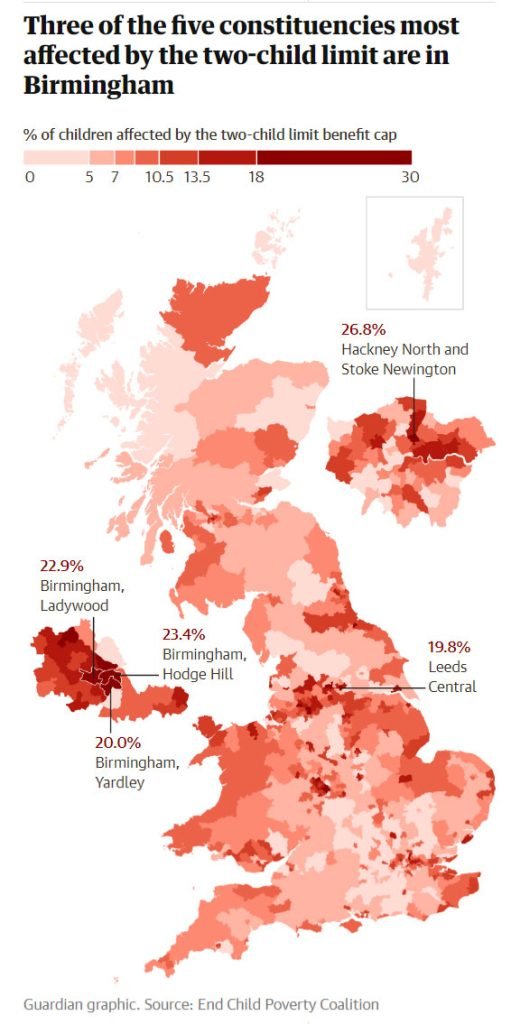What’s The Point of Labour, Under Sir Keir Starmer?
In a political landscape dominated by grand promises and ambitious rhetoric, the Labour Party finds itself once again entangled in a thorny dilemma, one that has earned its leader, Sir Keir Starmer, a rather unflattering moniker – “Sir Kid Starver.” The source of this derisive nickname lies in the party’s refusal to address a contentious policy: the two-child benefits cap, which has been criticized for plunging families into poverty.
Sir Keir Starmer, the Labour leader, has been tight-lipped when questioned about whether a Labour government would increase spending on public services.
However, it was his stance on the two-child benefits cap that caused a stir within his party and sparked a storm of public outrage. When pressed on the matter during an interview with the BBC’s Sunday program, Starmer confirmed that his government would maintain the Conservatives’ controversial policy.
A recent academic study has laid bare the detrimental effects of the two-child cap, revealing it to be a “poverty-producing” initiative, failing to achieve its own stated objectives. The policy lacks any positive incentive for employment among poorer families. Such evidence should be enough to prompt a reconsideration of this harmful policy, but Labour’s leadership seems unyielding.
Ruth Patrick from the University of York said: “Our research evidence makes clear that the two-child limit and benefit cap are poverty-producing policies, which fail to meet their stated aims. Both policies need to be removed urgently, as part of a broader commitment to addressing child poverty and investing in children and families.”
Alex Beer, welfare programme head at the Nuffield Foundation, which funded the research, said: “The two-child limit and the benefit cap are not incentivising families as the government intended and instead is leaving them unable to afford even basic necessities and affecting their mental health. These policies should be placed under review, and ideally removed.”
The stance is seen by some in the party as an indicator of the lack of strength of its determination to tackle child poverty. However, one party insider suggested Starmer could revisit the policy if the public finances improved.

The cap, first introduced in 2013 and followed by the two-child limit in 2017, places a ceiling on the amount of benefits a household can receive if they have little or no income. Consequently, thousands of households and over 100,000 children have been affected, leaving them struggling to afford basic necessities such as food, clothing, and heating. Ethnic minorities and larger families, in particular, bear the brunt of this policy, exacerbating the cycle of poverty and impacting the emotional and physical development of vulnerable children.
It was designed to force parents of larger families to find a job or work more hours, but academic studies showed its main function has been to impoverish families rather than increase employment.
Ironically Labour’s shadow work and pensions secretary, Jonathan Ashworth, previously condemned the policy as “heinous,” and many within the party called for its abolishment. Yet, Starmer remains resolute, stating on Sunday that he will not change this policy if Labour comes to power.
In February 2020, Starmer said he wanted to scrap it in order to help “tackle the vast social injustice in our country”. However, as we all know by now Starmer has a habit of saying what people want to hear when he needs their votes just to let them down when he gets what he wanted.
Senior Labour insiders said they agreed that the policy was “horrible” and would not exist “in a perfect world” but said the party was not making any spending commitments it was unable to deliver on. “I can see why colleagues might feel uncomfortable with this but we’ve got to be realistic about the state of the economy,” they said.
Meg Hillier, Labour MP for Hackney South and Shoreditch, and chair of the influential Commons public accounts committee, told the BBC’s Westminster Hour: “Well, I was never comfortable about having the child benefit cap come in … personally, I’d be lobbying for a lifting of that.”
Rosie Duffield, Labour MP for Canterbury, who is on the centre-right of the party, responded to Starmer’s comments by describing the two-child policy as “one of the most unpleasant pieces of legislation ever to have been passed in the UK”.
She tweeted: “It’s very rare for someone to enter the House of Commons having been on tax credits, but myself and a few others did in 2017; scrapping this cruel policy was one of our shared political motives.”
The two-child benefits cap represents a glaring failure in Labour’s commitment to tackling child poverty. It stands as a stark contradiction to Starmer’s previous statements about addressing social injustice in the country.
The refusal to scrap this cruel policy has left many anti-poverty campaigners, social policy academics, and left-leaning thinktanks disheartened and incredulous.
While the shadow chancellor, Rachel Reeves, deems abolishing the cap unaffordable in the present economic climate, campaigners argue that it is the most cost-effective way of reducing child poverty. Investing in the well-being of children, our future, should be a priority regardless of fiscal challenges.
The refusal of Labour to commit to scrapping the cap not only disappoints anti-poverty campaigners and social policy academics but also raises concerns that, if elected, Labour may subject the disadvantaged to further Tory policies and austerity under the guise of different rhetoric. This missed opportunity leaves us questioning the purpose and integrity of a party that claims to champion the interests of the working class and marginalized communities.
The Labour Party, in its current stance, risks perpetuating the cycle of poverty and failing to address the pressing needs of vulnerable families. A party that truly seeks to uplift society and bring about positive change must be willing to prioritise the welfare of its citizens over political expediency. The poor and marginalised deserve better.
Support Independent Journalism Today
Our unwavering dedication is to provide you with unbiased news, diverse perspectives, and insightful opinions. We're on a mission to ensure that those in positions of power are held accountable for their actions, but we can't do it alone. Labour Heartlands is primarily funded by me, Paul Knaggs, and by the generous contributions of readers like you. Your donations keep us going and help us uphold the principles of independent journalism. Join us in our quest for truth, transparency, and accountability – donate today and be a part of our mission!
Like everyone else, we're facing challenges, and we need your help to stay online and continue providing crucial journalism. Every contribution, no matter how small, goes a long way in helping us thrive. By becoming one of our donors, you become a vital part of our mission to uncover the truth and uphold the values of democracy.
While we maintain our independence from political affiliations, we stand united against corruption, injustice, and the erosion of free speech, truth, and democracy. We believe in the power of accurate information in a democracy, and we consider facts non-negotiable.
Your support, no matter the amount, can make a significant impact. Together, we can make a difference and continue our journey toward a more informed and just society.
Thank you for supporting Labour Heartlands












